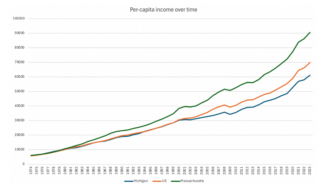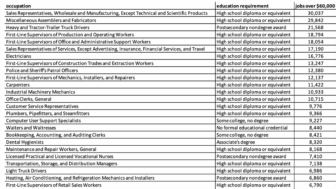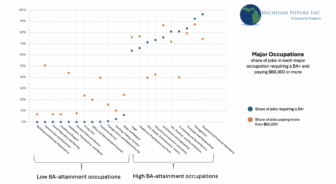
Terrific news from Lansing. Starting with the 2022 tax year the state match for the federal Earned Income Tax Credit is now 30 percent up from six percent. A historic win for Michigan’s working families and Michigan employers. Michigan goes from one of the least generous state matches of the federal EITC to one of the most generous.
The EITC is pro work and an incentive to go back to work. It is good for both workers and employers. Michigan’s low-wage workers need help paying the bills now. Michigan employers having trouble finding enough workers to operate and expand their enterprises also need help now. Immediate expansion of the state’s EITC is the best way of accomplishing both.
In a 2022 letter to the Governor and legislative leadership, 12 local chambers of commerce laid out the employers case for a big expansion of the state’s Earned Income Tax Credit. They wrote:
We support and applaud this legislation, as it exemplifies a pro-work philosophy and provides financial incentive to increase participation in the workforce; as you are aware, workforce challenges are top-of-mind for the business community, and these challenges are predicted to continue for at least another decade.
We offer a strong business case for the expansion of Michigan’s EITC:
• The EITC encourages work: It is explicitly designed to encourage greater participation in the workforce because it is only available to families that work. In a time when many employers are having difficulty filling available jobs, the EITC has a proven track record of pulling people into the workforce.
• The EITC increases local purchasing power: Research indicates that families mostly use the EITC to pay for necessities, repair homes, maintain vehicles that are need to commute to work and, in some cases, obtain additional education. The bigger the credit, the more money spent in locally.”
Expanding Michigan’s EITC from six to 30 percent provides more than 730,000 households raising nearly one million children nearly $400 million more to pay the bills year after year after year. An average of an extra $600 annually for each household.
Combined the federal and state Earned Income Tax Credit provides a refundable tax credit that can provide up to $9,000 to eligible households at tax time. Households with at least one working adult are eligible in 2022 for the credit with household income up to $59,187.
But the incentive to work is only if potential workers know about it. And there we still have problems which employers are in the best position to solve. The IRS estimates that about 20 percent of Michigan households with a working adult are eligible for the EITC but do not file. That is 180,000 households statewide.
And low-wage workers almost certainly don’t know that their credit can increase the more they work up to the point where the phase-out accelerates.
This year in particular, as Michigan takes on a historic expansion of its state EITC, Michigan businesses can play a pivotal role in helping more of their workers claim this valuable credit. We need employers––for both their payroll workers and contractors––to help their low-wage workers know about and file for the federal and state Earned Income Tax Credit. Even better would be letting lower-wage employees and contractors know about EITC benefits when they are hired.
Employers don’t have to do this on their own. Across the state there are Volunteer Income Tax Assistance (VITA) programs. The tax prepares are part of the IRS’s VITA program. Services are not only free, they are also a reliable and trusted source for preparing tax returns. All VITA volunteers who prepare returns must take and pass tax law training that meets or exceeds IRS standards. This training includes maintaining the privacy and confidentiality of all taxpayer information. In addition to requiring volunteers to certify their knowledge of the tax laws, the IRS requires a quality review check for every return prepared at a VITA site prior to filing.







